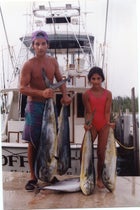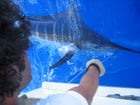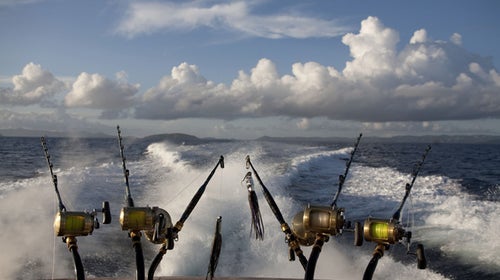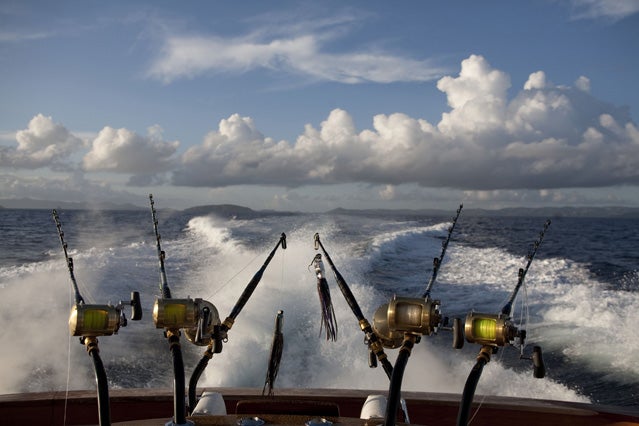LATE IN THE SUMMER, a gentle southeast breeze nudges our vessel back to Florida from a trip to the southern Bahamas. I’d been right to expect a calm, reflective journey on the Ebb Tide, my old 42-foot Hatteras sportfishing boat. During our family’s past month at sea, there had been many adventures and fervent conversations to consider, along with evenings anchored out in the lee of a few lonely rocks, sitting on the bridge with a beer in my hand, feeling humbled by an epic, darkening sky.
Josh and Katya 20 years ago with mahi mahi
 Josh and Katya 20 years ago with mahi mahi
Josh and Katya 20 years ago with mahi mahiJosh wiring a 250-lb. blue marlin
 Josh wiring a 250-lb. blue marlin
Josh wiring a 250-lb. blue marlinI’ve made this passage many times since my dad first brought me to the Bahamas as a 15-year-old, fired up by the Odyssean blue-water conquests of Ernest Hemingway. Hemingway inspired me to learn how to read the ocean for color changes, weed lines, and feeding birds—the detective work of big-game fishing. I wanted to be like him in all respects. I wanted to write great books and battle 800-pounders and bring them back to the dock for enduring glory.
As a kid, I began learning the nuts and bolts of fishing by walking the docks of places like Montauk, New York, and Bimini, in the Bahamas. I drove tough-talking captains crazy with my barrage of questions: Where’d you find them? What bait did you use? How far out did you set your lines? What was the tide?
Early on I recognized that fishing captains were the real artists of the sport. Like magicians or visionaries, captains could find giant, fierce fish in the vast sea—they had dozens of crafty tricks for getting fish into the boat. Anglers were suckers who paid big bucks and sweated it out in the fighting chair, pumping and reeling. I idolized fishing captains like most boys idolized baseball players.
Now, cruising home after a month fishing, recent trips and older ones blend together. I recall days with my dad off Bimini when schools of giant bluefin crowded the ocean—you could almost walk across their broad, muscular backs—and marlin were free-jumping and finning on the surface. It was a great picnic out there.
In the 1950s, when I was a teenager, most anglers didn’t understand that the greater glory was in releasing marlin and tuna to fight another day. To us it was manifestly clear that the infinite ocean could never run out of fish. No one I knew fretted about the morality of killing big fish for sport. We brought our graying dead marlin and tuna to the dock and hung them up for photos like strutting gunslingers.
But today, 50 years later, it’s hard to catch any big fish off Bimini, the closest Bahamian island to Florida. Marlin and tuna populations have been depleted by international fleets of commercial longline and purse-seine boats that hunt with deadly technology and greed. Eighty percent of the Atlantic’s populations of bluefin have been wiped out and 50 percent of the marlin, mainly by commercial fishing. Each year thousands of Atlantic marlin are killed inadvertently on bait set for tuna and swordfish. Bycatch is the benign word used to describe tons and tons of uselessly slaughtered marlin.
When we search for marlin these days, we sometimes go through hundreds of miles of dead ocean before we find one off the rocky point of some distant island or in a stretch of racing current between two unmarked reefs. Traveling that far takes a lot of preposterously expensive fuel, costing as much as $12 a gallon, and when the big drums arrive in the southern Bahamas, the fuel is often filthy-old and gums up our diesels. Out where we fish, there are no mechanics to repair broken engines, no marinas to spend a safe night. Big-game fishing in its twilight is far-fetched and sometimes inescapably sad. But it is also beautiful and oddly enduring, in the manner of all dreams and myths.
FIVE DAYS EARLIER, before starting our cruise home on the Ebb Tide, my son Josh, my wife Bonnie, and I were heading into a brisk 20-knot southeast wind off the sparsely populated island of Rum Cay. My 24-year-old daughter, Katya, and Josh’s wife, Desi, had decided to get off the boat that afternoon, to explore the island and take photographs. Josh, 32, is a powerful man, a champion martial artist, and also a successful author. When he was a boy, he was a great chess talent, and we traveled the world together so he could compete in tournaments. I wrote a book about fathering a prodigy, Searching for Bobby Fischer, which was made into a film. That was a long time ago, but there are moments when I look at him and still see the tiny chess champ.
Josh and I were on the bridge looking for birds, not talking much, while Bonnie stood below in the cockpit. My wife enjoys big water, smiles enigmatically when we hit a large wave or fall deeply into the trough. I steered the Ebb Tide toward a spot several miles off the southeast corner of the island, where the drop is steep and there’s usually a lot of current.
This was our last fishing day of the summer. The next morning, Josh would leave the boat with Desi to go back to New York City. I wanted to catch a blue marlin, the best final act I know for a fishing trip or a fishing life. I knew Josh was hoping to catch a big yellowfin tuna for a sushi dinner before departing, but we hadn’t caught a single tuna in three weeks of trolling.
The three of us were feeling a little sad and wondering if we’d ever get back here again. Every summer these trips get harder to arrange, more expensive, more outside the context of our city lives. Surely some of this was in the air as I steered.
“Over there, Dad, birds,” Josh called, pointing east. I peered at the horizon but couldn’t see a thing. “Come on, man, turn the boat,” he said. “There’s a big school. Look at all the birds. Look, will ya?”
When I was young, my eyes were good and I could see the birds better than most. Now I often imagine birds where there are none and can’t see them when they are there.
“There’s a big school, probably yellowfin!” Josh turned the wheel, and I nodded as if I could see.
Soon we were very close and even I could see the boobies and frigates swooping down on the waves for scraps of baitfish. Almost surely we were on top of a group of feeding tuna. We trolled feathers around the birds and immediately hooked up. They were small blackfin, I guessed, delicious eating, but before Josh and Bonnie could reel their fish halfway to the boat, they each felt a sudden, heavy weight on their line and then nothing at all. Sharks had ripped the smaller fish off their hooks. I steered the boat into deeper water while Josh rigged two lures and pointed impatiently back to the west—he knew his father had, once more, lost sight of the birds.
We went through again, hooking up almost immediately. Josh fought his fish for 20 minutes. From the bridge I could see a golden greenish heft ten feet below, and I thought it might be a big yellowfin. But after a few more cranks of the reel by Josh, I saw that we had a furious bull shark thrashing alongside us, snapping its jaws and beating the hull with its tail. The 200-pound shark had grabbed Josh’s blackfin and hooked itself. Josh cut it loose and then rigged up again, difficult to do while the boat rolled back and forth amid the building wind and sea.
All around the Ebb Tide, fat yellowfin were jumping clear of the waves, but we needed to change strategy, shorten our lines so we could hook one closer to the boat. Josh sat in the chair, and we trolled yellow feathers through the school. We hooked a blackfin, and Josh wound like a turbine; an eight-pounder came skipping across the waves like a flying fish. A large shark burst out from the whitewater behind the boat, lunging for the tuna but missing. Sharks were everywhere, including ferocious oceanic whitetips that were beautiful to look at as they surfed down the breakers.
We caught a few more small blackfin, flipping them into the cockpit hold. Bonnie wore her straw hat and held a long brown-handled knife in her hand. (If you don’t bleed a tuna while it’s still alive, the flesh becomes engorged with blood and fouled.) Every time we caught a tuna, Bonnie slit it between the gills and put a saltwater hose into its mouth while the fish flipped around and pumped its blood onto the deck.
Then we caught a bigger tuna, a 30-pound yellowfin. After decking it, Josh carefully took the hook out with one hand while covering the tuna’s eyes with his other—a trick to calm a big fish so it won’t beat itself up on the deck. Then he lifted the tuna in his arms and carefully put it back into the sea. He turned toward me on the bridge with a vulnerable expression: remorse, confusion. It was the only time we’d caught yellowfin all summer. But this happens on the Ebb Tide. We’ll catch a few fish, and then one of my kids will be swamped by guilt. That often spells the end of a day’s fishing.
BY NOW THE SEAS WERE ROUGH and getting worse. I called down from the bridge: “Hold on!” The deck was slick with tuna slime and tangled leaders. At the top of a crest, the Ebb Tide gave us a great sight of all the frenzied birds and breaking seas—with yellowfin jumping out and finning sharks stalking tuna—and then we’d pitch over into the trough and just try to stay in the boat. There are still days when the fishing is sublime, as if the Atlantic has been tipped onto its side and all the great fish have poured into a few windy, desolate acres.
It was time to go in, but instead I pointed the Ebb Tide away from shore, away from the birds, and we trolled big lures in water where we knew we wouldn’t hook any tuna. We trolled for another hour, with dark clouds rolling in from the south—the leading edge of a tropical storm.
At about six o’clock, we got a tremendous strike on the port-side flatline, which came tearing off a hefty 80-pound test reel—it took something very big to pull a line like that. I told Josh and Bonnie to bring the other lines in, which they did as the boat pitched onto its side. Most of the monofilament was gone from the reel before the other lines were in the boat and I could start backing into the waves, now running eight feet or more.
We’d hooked a big blue marlin. It was a quarter-mile away, and soon it started exploding out of the ocean, again and again and again. Josh, holding the rod with two hands, called for the fighting harness. I began backing up so we could get some line onto the reel. Seas were rolling into the cockpit. Bonnie was clearing all the rods off the deck. I backed into the sea for a half hour while Josh pumped and reeled.
Finally, we saw the swivel clip connected to the last 15 feet of 300-pound test leader. Josh jumped out of the chair, grabbed the leader, and began hauling with his arms, putting everything he had into it. The marlin wouldn’t budge. It kept pumping back down, swinging its huge tail while Josh held on and tried to haul it up—a standoff for 10 or 12 seconds. Then the big fish suddenly yielded and we had it alongside the Ebb Tide. I guessed it weighed around 500 pounds.
When the boat heeled onto its side, it leaned up against the marlin, and when it rolled back the other way, Josh was all stretched out holding the leader. I worried he would go over the side. I turned the boat into a following sea to stop the rolling and take the pressure off his arm. Meanwhile, I noticed that the school of tuna had traveled our way and birds were again swooping down on both sides of us.
Josh leaned over the water; his mother hugged his legs while the boat idled forward. He held the bill with one hand, trying to keep the fish’s big head down in the moving water so it could breathe and regain its strength while using the other to work the hook out gently—no jerking. If the marlin panicked, it might whack him in the neck with its bill, or, worse, snag him with the hook and pull him under.
When the hook came free, Josh grabbed the bill with both hands. He held on for about two minutes, and I eased the boat away from the tuna—we were afraid the weakened marlin might get hit by one of the big sharks swimming with the school. Soon the marlin was looking fierce again, all lit up with livid blue horizontal stripes and swinging its tail. When Josh let go, it swam down and away, slowly and steadily.
THERE ARE MANY SUMMER DAYS when the Atlantic is like a lake, particularly north of Cat Island. Five days after we caught the marlin, we were traveling home, presumably with no more smashing seas to survive. The memory of the big marlin nagged at me while we moved across flat water south of Little San Salvador Island, headed toward the horn of Eleuthera.
I hate leaving adventures behind: big seas, the fish, but mostly the uncanny connection with my family, who are like a band of warriors whenever the sea becomes threatening. Katya was on the bridge with me, and we started talking about the futility of describing the sea life to our city friends.
“Kat, you haven’t missed a summer out here since you were a baby,” I said at one point, pondering the fact that she’d soon be in graduate school in California and no longer available for these trips. “You’ve caught a lot of marlin. Sixty-eight blue marlin.”
“Dad, you have no idea if it’s 68 or 63,” she said, razzing me a bit. “You just made up that number.”
“Well, it’s around 68,” I said.
“W�ٱ𱹱��.”
Bonnie was below, sleeping, cooking, maybe reading. Katya went forward to sit on the bow. She took her familiar place on the boat’s pulpit, with her feet dangling down, almost touching the water, while she firmly held the railing above with both hands. She bit her lower lip and stared out to sea, striking the same pose she did as a skinny, brash seven-year-old who first climbed out there without my noticing. I figured she was wondering what to do with her life, if going back to school was the right decision. Katya looks at things very deeply and sometimes traps herself in doubt or fine-tuning. But her thoughtfulness is a joy to me.
We were in the Exuma Sound, beyond sight of land, with a hazy afternoon sky and seaweed floating listlessly on a hot ocean. Just three of us on board, but we were still a competent little crew—each of us could run the Ebb Tide if necessary. Still, I was missing Josh. It was as if the core strength of the boat had been seriously compromised.
The water seemed too calm, disturbingly so, and I wondered if bad weather was ahead. Soon the ocean was crowded with thick, shaggy spans of seaweed—some half as large as a football field—with plastic bottles, cans, and sundry chunks of garbage trapped in the growth. It was very weird, something I’d never seen before.
Katya came back onto the bridge. “What’s up, Dad?”
“I don’t know.” I recalled a day out here 25 years ago when we’d passed through a school of porpoises that went on and on for miles. From the tower, as far as you could see, they were racing, jumping, playing.
We watched the seaweed filling in around us like an ice floe. I worried that the greasy stuff would tangle the props or clog up the sea strainers, shutting us down in this lonely ocean.
But the Ebb Tide pushed through like an icebreaker. After another two hours, we’d made it across the unusual savanna, engines still running.
TWO DAYS LATER, we were 150 miles to the northwest, moving slowly across the Great Bahama Bank, a vast expanse of water as shallow as a pool. On a calm day, the Bank is mesmerizing. The clear water becomes a magnifying glass and the bottom—full of coral heads, spiny lobster, conch, snapper, and stretches of potholed sea desert—appears to be only inches away. We were just 75 miles from the Florida coast when we stopped for the night near undersea ledges where we could cast for snapper. There wasn’t another boat or mast to be seen in any direction.
I woke up in the middle of the night with my head smacking the ceiling three feet above my narrow bunk. The Ebb Tide was lurching in an awful way, the bow plunging down and then whipping back up against the short, shallow-water anchor line with an alarming snap. I found my boat shoes with my foot but couldn’t reach down to pull them on. I was banging against walls in the tiny cabin, trying to grab onto something. Somehow, my wife remained asleep in her bottom bunk.
I managed to get out my door and then up three steps into the salon. Katya was on the settee, holding on and staring out the window at huge black storm clouds illuminated by strings of lightning.
“Let’s get a better look,” I said.
We went outside and up the ladder to the bridge. The wind was blowing 50 knots, maybe more. We were surrounded on all sides by closing storms.
I wasn’t sure what to do. Should I pull the anchor? Try to idle into the wind? Or should we try to ride it out on the anchor? What was the best chance? At any moment, we could bottom out in the trough of a wave and founder or rip the bottom of the boat on a reef.
I decided we’d try to ride it out on the hook. But the boat was rearing like a crazed horse on a short lead. I feared the cleats would pull out of the deck. I needed to get out on the bow and play out another 100 feet of line to lessen the tension on the cleats. If Josh were on the boat, he’d crawl out there. But here’s the truth: With the boat plunging and jerking, and waves breaking across the bow, I wasn’t sure I could do it. If I went over the side in the dark with all of this wind and whitewater, I would never make it back to the boat. Still, I was the captain.
I was thinking this—maybe I said something to Katya—and looking for my flashlight when I saw that she was already off the bridge and shimmying along the gunwale toward the bow. I screamed into the wind: “Get back here!” But she was on the wet deck, moving low but very surely to the bow, where she wedged herself between the railing of the pulpit and one of the bow cleats to keep her balance. She waited between wave sets to get a little slack and then worked the hitches off the cleat. I was sick with worry that she might tangle in the line and get mangled or pulled over.
Then she snaked the line out a foot at a time, easing the boat back until it wasn’t pulling so hard on the upswing. She tied her hitches and double-checked them. Then she made it back across the deck, grabbed hold of the handrail, and came back along the gunwale and up the ladder to the bridge.
Bonnie was now standing beside me, and the three of us looked at the streams of lightning falling down, all around, creating deafening thunder. One of the thicker bolts seemed to explode when it hit the surface nearby.
“What would happen?” Katya yelled in my ear.
I didn’t answer. What would happen is that we’d be ashes or floating debris. Nothing much.
We watched the storm blowing up the sky. Maybe this is what it looks like at the very end, I thought. A final glimpse of a blast of light.
But we never got hit by lightning, which seems inexplicable. We never hit a reef. The storm rushed away to the north, like a vision, and the Bahama Bank got very quiet very quickly.
Almost instantly, we were mesmerized by the peaceful early morning, the vast expanse of shallow luminescent water. We watched a dozen small yellowtail snapper darting playfully beneath the transom of the Ebb Tide.
The new day was so convincingly immutable, as if marlin would always cruise the blue water just offshore of the islands. As if we’d always be here to appreciate them and the thick schools of tuna and the lurking sharks.
We didn’t feel like motoring back to the city, not yet. We went back to our cozy bunks and fell asleep.
New York City–based Fred Waitzkin is the author of Searching for Bobby Fischer, Mortal Games, and The Last Marlin. His first novel, The Dream Merchant, will be published in 2012 by St. Martin’s Press.


